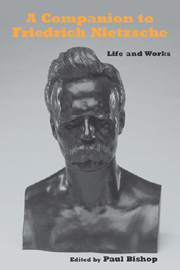Book contents
- Frontmatter
- Contents
- Acknowledgments
- A Note on Editions and Abbreviations
- Introduction
- Link to Nietzsche's Early Writings
- Link to The Birth of Tragedy
- Link to Untimely Meditations
- Link to Human, All Too Human
- Link to Daybreak
- Link to The Gay Science
- Link to Zarathustra
- Link to Beyond Good and Evil
- Link to On the Genealogy of Morals
- Link to The Case of Wagner and Nietzsche contra Wagner
- Link to Twilight of the Idols, The Anti-Christ, and Ecce Homo
- Link to the Nachlass
- Conclusion
- Notes on the Contributors
- Index
Conclusion
Published online by Cambridge University Press: 05 February 2013
- Frontmatter
- Contents
- Acknowledgments
- A Note on Editions and Abbreviations
- Introduction
- Link to Nietzsche's Early Writings
- Link to The Birth of Tragedy
- Link to Untimely Meditations
- Link to Human, All Too Human
- Link to Daybreak
- Link to The Gay Science
- Link to Zarathustra
- Link to Beyond Good and Evil
- Link to On the Genealogy of Morals
- Link to The Case of Wagner and Nietzsche contra Wagner
- Link to Twilight of the Idols, The Anti-Christ, and Ecce Homo
- Link to the Nachlass
- Conclusion
- Notes on the Contributors
- Index
Summary
IN HIS NOTEBOOKS FOR THE PERIOD from the end of 1876 to the summer of 1877, we find the following sketch for a section in the first volume of Menschliches, Allzumenschliches (Human, All Too Human) (MA I §292; KSA 2, 235–37). Where, in the published version of this passage, which is entitled “Forward” (“Vorwärts”), Nietzsche casts his observations in the form of recommendations for the reader, in this draft he states them as his personal ambition. So it seems appropriate, as a conclusion to this Companion to Friedrich Nietzsche, to his life and his works, to cite the wording from this version:
I want to become wise by the age of sixty, and I recognize this as a goal for many others. Much knowledge has to be acquired in the right order and to be synthesized. It is the good fortune of our age that one can still grow up for a while in a religion and, as far as music is concerned, can gain authentic access to art: in future ages this will no longer be so easily available. With the help of these personal experiences one begins to understand immense stretches of humankind: which is important, because our entire culture is based on these stretches. One must understand religion and art — if not, one cannot become wise. But one must be able to see beyond them; if one remains within, one cannot understand them. Likewise, metaphysics is a stage that one has to have attained. Likewise, history and all that is relativistic. One has to pursue the path of humankind as an individual in giant steps and go beyond the goal one has since reached.
Whoever wants to be wise has an individual goal, in which all that has been experienced — good fortune, misfortune, injustice, etc. — turns out to be a means, to be of help. Furthermore, human life acquires then its proper shape, for it is the older person who most easily achieves the goal of his entire nature. Life, too, proceeds with interest, its theme is very large and cannot be quickly exhausted. — Knowledge itself can have no further goal.
- Type
- Chapter
- Information
- A Companion to Friedrich NietzscheLife and Works, pp. 429 - 430Publisher: Boydell & BrewerPrint publication year: 2012



